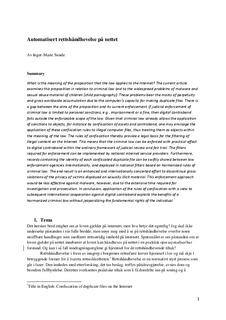| dc.description.abstract | What is the meaning of the proposition that the law applies to the Internet? The current article examines this proposition in relation to criminal law and to the widespread problems of malware and sexual abuse material of children (child pornography). These problems bear the marks of perpetuity and gross worldwide accumulation due to the computer’s capacity for making duplicate files. There is a gap between the aims of the proposition and its current enforcement. If judicial enforcement of criminal law is limited to personal sanctions, e.g., imprisonment or a fine, then digital contraband falls outside the enforceable scope of the law. Given that criminal law already allows the application of sanctions to objects, for instance by confiscation of assets and contraband, one may envisage the application of these confiscation rules to illegal computer files, thus treating them as objects within the meaning of the law. The rules of confiscation thereby provide a legal basis for the filtering of illegal content on the Internet. This means that the criminal law can be enforced with practical effect to digital contraband within the ordinary framework of judicial review and fair trial. The filters required for enforcement can be implemented by national internet service providers. Furthermore, records containing the identity of each confiscated duplicate file can be swiftly shared between law enforcement agencies internationally, and deployed in national filters based on harmonized rules of criminal law. The end result is an enhanced and internationally concerted effort to discontinue gross violations of the privacy of victims displayed on sexually illicit material. This enforcement approach would be less effective against malware, however, due to the extensive time required for investigation and prosecution. In conclusion, application of the rules of confiscation with a view to subsequent international cooperation against digital contraband exploits the benefits of a harmonized criminal law without jeopardizing the fundamental rights of the individual. | no_NO |
